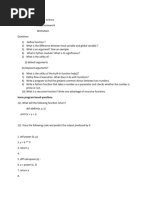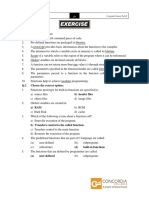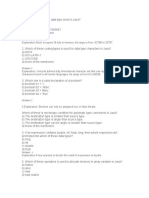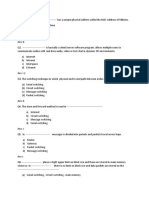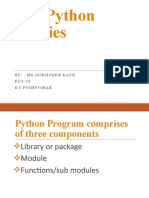Function Assignment
Uploaded by
Namita SahuFunction Assignment
Uploaded by
Namita SahuFunction assignment
Q-1. What is the default return value for a function that does not
return any value explicitly?
Q-2. Which of the following items are present in the function
header?
A. function name
B. function name and parameter list
C. parameter list
D. return value
Q-3. Which of the following enclose the input parameters or
arguments of a function?
A. brackets
B. parentheses
C. curly braces
D. quotation marks
Q-4. Which keywords marks the beginning of the function block?
Q-5. What is the name given to that area of memory, where the
system stores the parameters and local variables of a function call?
A. a heap
B. storage area
C. a stack
D. an array
Q6Write python statement in the given missing line which will
correctly represent the function body in the given code snippet?
def f(number):
# Missing function body
print(f(5))
Q7. What is the output of the following code snippet?
def func(message, num = 1):
print(message * num)
func('Welcome')
func('Viewers', 3)
Q8. What is the output of the following code snippet?
def myfunc(text, num):
while num > 0:
print(text)
num = num - 1
myfunc('Hello', 4)
Q9. What is the output of the following code snippet?
def func(x = 1, y = 2):
x = x + y
y += 1
print(x, y)
func(y = 2, x = 1)
Q10. What is the output of the following code snippet?
num = 1
def func():
num = 3
print(num)
func()
print(num)
Q11. What is the output of the following code snippet?
num = 1
def func():
num = num + 3
print(num)
func()
print(num)
Q12. What is the output of the following code snippet?
num = 1
def func():
global num
num = num + 3
print(num)
func()
print(num)
Q12. What is the output of the following code snippet?
def test(x = 1, y = 2):
x = x + y
y += 1
print(x, y)
test(2, 1)
Q13. Which of the following function headers is correct?
A. def f(a = 1, b):
B. def f(a = 1, b, c = 2):
C. def f(a = 1, b = 1, c = 2):
D. def f(a = 1, b = 1, c = 2, d):
Q14. What is the output of the following code snippet?
myList = [lambda x: x ** 2,
lambda x: x ** 3,
lambda x: x ** 4]
for f in myList:
print(f(3))
Q15. What is the output of the following code snippet?
def func( mylist ):
mylist = [1,2,3,4];
print ("Values inside the function: ", mylist)
return
mylist = [10,20,30];
func( mylist );
print ("Values outside the function: ", mylist)
Q16. What is the output of the following code snippet?
x = 50
def func():
global x
print('x is', x)
x = 2
print('Changed global x to', x)
func()
print('Value of x is', x)
Q17. Which of the following function calls can be used to invoke the
below function definition?
def test(a, b, c, d)
A. test(1, “2”, “3”, “4”)
B. test(a = 1, 2, 3, 4)
C. test(a = 1, b = 2, c = 3, 4)
D. test(a = 1, b = 2, c = 3, d = ‘d’)
E. test(1, 2, 3, d = 4)
Q18. def myfunc(text, num):
while num > 0:
num = num - 1
num=4
myfunc('Hello', num)
19. What is the output of the following code snippet?
def func(x = 1, y = 2):
return x + y, x - y
x, y = func(y = 2, x = 1)
print(x, y)
20. What is the output of the following code snippet?
def func():
text = 'Welcome'
name = (lambda x:text + ' ' + x)
return name
msg = func()
print(msg('All'))
21. What is the output of the following code snippet?
def func(x, y=2):
num = 1
for i in range(y):
num = num * x
return num
print (func(4))
print (func(4, 4))
22. What is the output of the following code snippet?
def addFunc(item):
item += [1]
mylist = [1, 2, 3, 4]
addFunc(mylist)
print (len(mylist))
23. What is the output of the following code snippet?
myList = [1, 2, 3, 4, 5]
def func(x):
x.pop()
x.pop()
x.insert(-1, 0)
print ("Inside func():", x)
func(myList)
print ("After function call:", myList)
24. Find O/P:
def f(value, values):
v = 1
values[0] = 44
t = 3
v = [1, 2, 3]
f(t, v)
print(t, v[0])
Q25. What will be the output of the following code snippet?
data = [[[1, 2], [3, 4]], [[5, 6], [7, 8]]]
def fun(m):
v = m[0][0]
for row in m:
for element in row:
if v < element: v = element
return v
print(fun(data[0]))
Q26. What will be the output of the following code snippet?
fruit = {}
def add(index):
if index in fruit:
fruit[index] += 1
else:
fruit[index] = 1
add('Carrot')
add('Beet Root')
add('Tomato')
print (len(fruit))
What will be the output of the following Python code?
1. x = 50
2. def func(x):
3. print('x is', x)
4. x = 2
5. print('Changed local x to', x)
6. func(x)
7. print('x is now', x)
Q What will be the output of the following Python code?
1. x = 50
2. def func():
3. global x
4. print('x is', x)
5. x = 2
6. print('Changed global x to', x)
7. func()
8. print('Value of x is', x)
What will be the output of the following Python code?
1. def say(message, times = 1):
2. print(message * times)
3. say('Hello')
4. say('World', 5)
5. def maximum(x, y):
6. if x > y:
7. return x
8. elif x == y:
9. return 'The numbers are equal'
10. else:
11. return y
12.
13. print(maximum(2, 3))
This set of Python Questions for entrance examinations focuses on “Functions”.
1. Which are the advantages of functions in python?
a) Reducing duplication of code
b) Decomposing complex problems into simpler pieces
c) Improving clarity of the code
d) All of the mentioned
View Answer
Answer: d
Explanation: None.
2. What are the two main types of functions?
a) Custom function
b) Built-in function & User defined function
c) User function
d) System function
View Answer
Answer: b
Explanation: Built-in functions and user defined ones. The built-in functions are part of the Python
language. Examples are: dir(), len() or abs(). The user defined functions are functions created
with the def keyword.
3. Where is function defined?
a) Module
b) Class
c) Another function
d) All of the mentioned
View Answer
4. What is called when a function is defined inside a class?
a) Module
b) Class
c) Another function
d) Method
View Answer
Answer: d
Explanation: None.
5. Which of the following is the use of id() function in python?
a) Id returns the identity of the object
b) Every object doesn’t have a unique id
c) All of the mentioned
d) None of the mentioned
View Answer
Answer: a
Explanation: Each object in Python has a unique id. The id() function returns the object’s id.
6. Which of the following refers to mathematical function?
a) sqrt
b) rhombus
c) add
d) rhombus
View Answer
Answer: a
Explanation: Func
You might also like
- Solution Manual For Data Abstraction Problem Solving With C Walls and Mirrors 6 e Frank M Carrano Timothy Henry100% (51)Solution Manual For Data Abstraction Problem Solving With C Walls and Mirrors 6 e Frank M Carrano Timothy Henry15 pages
- MCQ (Revision Tour, Functions and File Handling) With SolutionNo ratings yetMCQ (Revision Tour, Functions and File Handling) With Solution45 pages
- 12B - Computer Science - Model 2 - 11 - 11 - 2021No ratings yet12B - Computer Science - Model 2 - 11 - 11 - 20216 pages
- Class: XII Time: 1.5 Hours Subject: Computer Science Marks:50 Part-I Choose The Best Answer:-10 X 1 10No ratings yetClass: XII Time: 1.5 Hours Subject: Computer Science Marks:50 Part-I Choose The Best Answer:-10 X 1 102 pages
- GD Goenka Signature School: Worksheet Iii - Functions & File Handling Class Xii - Computer ScienceNo ratings yetGD Goenka Signature School: Worksheet Iii - Functions & File Handling Class Xii - Computer Science2 pages
- Python Question and Answers - Built-In Functions - 10% (1)Python Question and Answers - Built-In Functions - 115 pages
- Q.1 Fill in The Blanks:: (Ch#13) Functions Computer Science Part-IINo ratings yetQ.1 Fill in The Blanks:: (Ch#13) Functions Computer Science Part-II14 pages
- BCA-241:Object Oriented Programming and C++ S.Y. B.C.A. (Science)No ratings yetBCA-241:Object Oriented Programming and C++ S.Y. B.C.A. (Science)4 pages
- Indian School Al Wadi Al Kabir: Answer The FollowingNo ratings yetIndian School Al Wadi Al Kabir: Answer The Following3 pages
- Ans-Mid-exam-Advanced-3rd-General.pdf مترجمNo ratings yetAns-Mid-exam-Advanced-3rd-General.pdf مترجم6 pages
- What Is The Difference Between A Library and A PackageNo ratings yetWhat Is The Difference Between A Library and A Package32 pages
- Human Body Word Scramble: Unscramble The Words BelowNo ratings yetHuman Body Word Scramble: Unscramble The Words Below3 pages
- Xample Program in C++ Using File Handling To Perform Following OperationsNo ratings yetXample Program in C++ Using File Handling To Perform Following Operations6 pages
- Kendriya Vidyalaya Fort William Time Table For Online Classes Class Vi To XiiNo ratings yetKendriya Vidyalaya Fort William Time Table For Online Classes Class Vi To Xii5 pages
- (I) Total (Ii) 7salute (Iii) Que$tion (Iv) GlobalNo ratings yet(I) Total (Ii) 7salute (Iii) Que$tion (Iv) Global1 page
- Searching An Element in The List: Linear Search Binary SearchNo ratings yetSearching An Element in The List: Linear Search Binary Search13 pages
- A Short Report On Flood Situation in Sagar IslandNo ratings yetA Short Report On Flood Situation in Sagar Island4 pages
- Calculating Time Required To Complete Execution in Type of SortingNo ratings yetCalculating Time Required To Complete Execution in Type of Sorting5 pages
- A) Platform-Independent Platform (OS) The Source Code Was Compiled". That Is, A Java Source File Can Be Compiled On Any OS andNo ratings yetA) Platform-Independent Platform (OS) The Source Code Was Compiled". That Is, A Java Source File Can Be Compiled On Any OS and5 pages
- Ossher - Subject-Oriented Programming Supporting Decentralized Development of ObjectsNo ratings yetOssher - Subject-Oriented Programming Supporting Decentralized Development of Objects13 pages
- C++ How To Program 10th Edition Deitel Solutions Manual100% (1)C++ How To Program 10th Edition Deitel Solutions Manual49 pages
- TF Better Performance With TF - FunctionNo ratings yetTF Better Performance With TF - Function5 pages
- College of Electrical and Mechanical Engineering, Nust IslamabadNo ratings yetCollege of Electrical and Mechanical Engineering, Nust Islamabad14 pages
- Epson Sample Programming Placement Paper Level1No ratings yetEpson Sample Programming Placement Paper Level19 pages
- Introduction To Object-Oriented Design and The UML100% (1)Introduction To Object-Oriented Design and The UML20 pages
- Library Management System Using Core JavaNo ratings yetLibrary Management System Using Core Java11 pages
- RDF Schema: Basic Ideas: 1.1 Classes and PropertiesNo ratings yetRDF Schema: Basic Ideas: 1.1 Classes and Properties16 pages
- 12th-Computer-Science-EM-First-Revision-Exam-2024-Question-Paper-Virudhunagar-District-English-Medium-PDF-DownloadNo ratings yet12th-Computer-Science-EM-First-Revision-Exam-2024-Question-Paper-Virudhunagar-District-English-Medium-PDF-Download2 pages
- Difference Between Multiple and Multilevel InheritanceNo ratings yetDifference Between Multiple and Multilevel Inheritance6 pages
- Solution Manual For Data Abstraction Problem Solving With C Walls and Mirrors 6 e Frank M Carrano Timothy HenrySolution Manual For Data Abstraction Problem Solving With C Walls and Mirrors 6 e Frank M Carrano Timothy Henry
- MCQ (Revision Tour, Functions and File Handling) With SolutionMCQ (Revision Tour, Functions and File Handling) With Solution
- Class: XII Time: 1.5 Hours Subject: Computer Science Marks:50 Part-I Choose The Best Answer:-10 X 1 10Class: XII Time: 1.5 Hours Subject: Computer Science Marks:50 Part-I Choose The Best Answer:-10 X 1 10
- GD Goenka Signature School: Worksheet Iii - Functions & File Handling Class Xii - Computer ScienceGD Goenka Signature School: Worksheet Iii - Functions & File Handling Class Xii - Computer Science
- Python Question and Answers - Built-In Functions - 1Python Question and Answers - Built-In Functions - 1
- Q.1 Fill in The Blanks:: (Ch#13) Functions Computer Science Part-IIQ.1 Fill in The Blanks:: (Ch#13) Functions Computer Science Part-II
- BCA-241:Object Oriented Programming and C++ S.Y. B.C.A. (Science)BCA-241:Object Oriented Programming and C++ S.Y. B.C.A. (Science)
- Indian School Al Wadi Al Kabir: Answer The FollowingIndian School Al Wadi Al Kabir: Answer The Following
- Oracle Certified Associate Java Programmer OCAJP 1Z0 808From EverandOracle Certified Associate Java Programmer OCAJP 1Z0 808
- What Is The Difference Between A Library and A PackageWhat Is The Difference Between A Library and A Package
- Human Body Word Scramble: Unscramble The Words BelowHuman Body Word Scramble: Unscramble The Words Below
- Xample Program in C++ Using File Handling To Perform Following OperationsXample Program in C++ Using File Handling To Perform Following Operations
- Kendriya Vidyalaya Fort William Time Table For Online Classes Class Vi To XiiKendriya Vidyalaya Fort William Time Table For Online Classes Class Vi To Xii
- Searching An Element in The List: Linear Search Binary SearchSearching An Element in The List: Linear Search Binary Search
- Calculating Time Required To Complete Execution in Type of SortingCalculating Time Required To Complete Execution in Type of Sorting
- A) Platform-Independent Platform (OS) The Source Code Was Compiled". That Is, A Java Source File Can Be Compiled On Any OS andA) Platform-Independent Platform (OS) The Source Code Was Compiled". That Is, A Java Source File Can Be Compiled On Any OS and
- Ossher - Subject-Oriented Programming Supporting Decentralized Development of ObjectsOssher - Subject-Oriented Programming Supporting Decentralized Development of Objects
- C++ How To Program 10th Edition Deitel Solutions ManualC++ How To Program 10th Edition Deitel Solutions Manual
- College of Electrical and Mechanical Engineering, Nust IslamabadCollege of Electrical and Mechanical Engineering, Nust Islamabad
- Introduction To Object-Oriented Design and The UMLIntroduction To Object-Oriented Design and The UML
- RDF Schema: Basic Ideas: 1.1 Classes and PropertiesRDF Schema: Basic Ideas: 1.1 Classes and Properties
- 12th-Computer-Science-EM-First-Revision-Exam-2024-Question-Paper-Virudhunagar-District-English-Medium-PDF-Download12th-Computer-Science-EM-First-Revision-Exam-2024-Question-Paper-Virudhunagar-District-English-Medium-PDF-Download
- Difference Between Multiple and Multilevel InheritanceDifference Between Multiple and Multilevel Inheritance








































